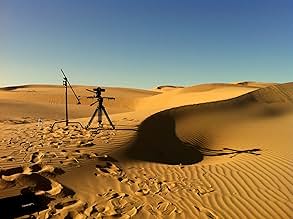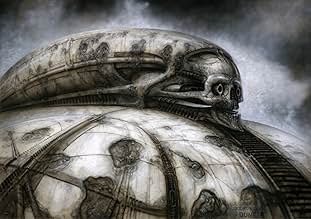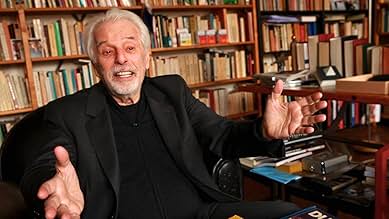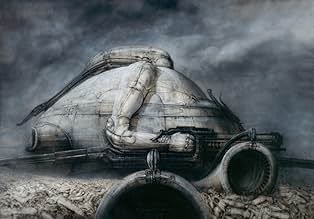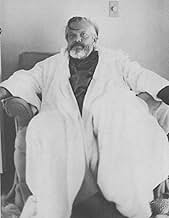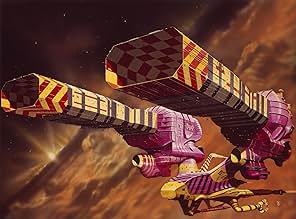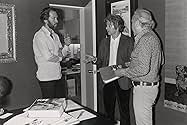Die Geschichte des Kultfilmregisseurs Alejandro Jodorowsky in seiner ambitionierten, aber letztlich zum Scheitern verurteilten Verfilmung des bahnbrechenden Science-Fiction-Romans.Die Geschichte des Kultfilmregisseurs Alejandro Jodorowsky in seiner ambitionierten, aber letztlich zum Scheitern verurteilten Verfilmung des bahnbrechenden Science-Fiction-Romans.Die Geschichte des Kultfilmregisseurs Alejandro Jodorowsky in seiner ambitionierten, aber letztlich zum Scheitern verurteilten Verfilmung des bahnbrechenden Science-Fiction-Romans.
- Auszeichnungen
- 12 Gewinne & 27 Nominierungen insgesamt
- Self
- (Archivfilmmaterial)
- Self
- (Archivfilmmaterial)
- (Synchronisation)
- Themselves
- (Archivfilmmaterial)
- Self
- (Archivfilmmaterial)
Empfohlene Bewertungen
Unlike the particularly lame set of experts rounded up here (fan boys as film critics and untalented film directors Richard Stanley and Nicolas Winding Refn), I was a film buff in the '60s and '70s and properly placed Alexandro's work ("El Topo", "Fando & Lis", "The Holy Mountain") in the context of his betters: Glauber Rocha from Brazil and the fabulous European surrealist Arrabal.
Frank Pavich who directed this documentary fails to mention even in passing that "Fando and Lis" was adapted by AJ from a play by Arrabal. "Viva la Muerte!" by Arrabal was just as influential a midnight movie at the outset of the '70s as AJ's "El Topo", and all the art-house directors of that era owed plenty to the innovations of Rocha in a series of films from which "Antonio das Mortes" stood out, and would still be a reference point if folks did their homework.
In covering AJ's work this documentary is incomplete and misleading. The most famous anecdote regarding "The Holy Mountain" concerns star Dennis Hopper going crazy during filming and leaving the set, forcing AJ to replace him. Nowhere is that level of historical research encountered here.
Instead we have AJ pontificating, gesticulating, and basically acting the part of "the mad genius" for Pavich's camera. This routine, favored by Werner Herzog in recent decades gets old in a hurry and made watching "J's 'Dune" a real chore. I interviewed Terry Gilliam in 1981 in Manhattan on his promo junket for the release of "The Time Bandits" and he behaved in person one-on-one quite similar to the way Jodo acts here. Both men are so full of enthusiasm and passion concerning making movies that they literally seem about to blow a gasket at any moment.
Both Jodorowsky and Gilliam have become famous over the years for the outlandishness (and scale) of their projects, and their becoming folk heroes by going Don Quixote-like up against the windmills/giants of the Film Establishment, i.e., the guys who hold the purse-strings.
Much is made here of Hollywood's inability to see the power of AJ's meticulously (and permanently) enshrined shooting script that is bound in hardback the size of an unexpurgated Webster's dictionary. Both he and Gilliam seem to have a mental block against recognizing the difference between making a large-scale, say mature David Lean- scale, movie and writing the Great American Novel or crafting the ultimate Broadway Play. Self-appointed "visionaries" need not apply - only fools like Bob Guccione and his "most expensive porn film of all time" Caligula can do that. Artists like these should sensibly follow in the footsteps of avant-garde filmmakers, Maya Deren, Ed Emshwiller, Stan Brakhage and Stan Vanderbeek: create independent, no-budget, uncompromising underground cinema. Leave the $200,000,000 projects to hacks like Michael Bay.
It was Dino De Laurentiis (along with Joseph E. Levine and Alexander Salkind) who initiated the era of big-budgets we currently live with: back when Dune by AJ was being worked on and shopped the entire film industry was functioning under very tight budgetary restrictions following the near-collapse of the studios in 1969: no film in the '70s was being green-lighted with a budget as high as $15,000,000, which Dune would entail.
For the record, it was 1976 when Levine's "A Bridge Too Far", Dino's "King Kong" and Salkind's "Superman" were independently produced at much higher budgets, opening the floodgates. And not coincidentally it was Dino, through his daughter, who ended up producing the David Lynch flop of "Dune".
So the doc's argument about AJ's war with stupid studio execs is completely off- base and ignorantly presented -their hands were tied at that time.
Worse than that, the movie's implication about the power and influence of AJ's Dune, even without it being made, is 180 degrees off the mark. Sure, we see trotted out a who's who of ultra-creative talent that was working on preparing the movie: Giger, Moebius, O'Bannon, even hangers-on like Welles and Dali. Ridley Scott is rightly shown to be the chief recipient of the fruits of their labors -going from the promising art-house director of "The Duellists" to fame and fortune (via hiring AJ's technicians) with increasingly bigger- canvas epics like "Alien", "Blade Runner" and ultimately "Gladiator" and many others all of which not coincidentally resemble the '60s epics that sank Hollywood's fortunes and led to that moratorium on big-budget projects in the first place.
The legacy of this unfinished film is not launching top technical and creative talent in a host of blockbusters but rather the industry's ongoing fascination with flashy, mindless crap, currently emblazoned by the application of 3-D (a tarnished medium from the early '50s) to so many pictures as well as fake IMAX (not using the IMAX photographic system) to market the junk.
What Pavich presents as AJ's strengths are in fact his fatal flaws. Rounding up the top talent - it seems like he has the Midas touch in finding the best in each field, does not disguise the obvious fact that had he actually been able to make "Dune", AJ would be calling all the shots, like a Robert Rodriguez (writer/director/cameraman/editor). Evidence of this creeps into the doc with the segment dealing with Doug Trumbull, who is sloughed off as arrogant or not a team player when AJ rejects his participation out of hand, when in fact it is obvious that AJ is the arrogant s.o.b., not Doug.
AJ would have a firmer and more legitimate place in film history had he remained independent and tackled smaller-scale films that expressed exactly what he wanted to say, a la the models of Jim Jarmusch or Woody Allen.
Although the story of this "failed" project is fascinating, it was Jodorowsky's passion and drive that made me pay to see this movie twice. This is an absolute must-see for sci-fi fans but should also be viewed by artists, writers, film makers, sculptures, dancers, foley artists or anyone who has creative passion.
It is inspiring to see a man, albeit a near lunatic, with such vision, scope and ambition.
And last night I popped the disc in. Quite a lot of the first part is just talking to set the stage and explain who Jodorowsky is and what kind of movies he made. As it moves along it gets more interesting as we are shown some of the drawings and the out-of-this-world concepts in this 'Dune' movie. That of course never got made.
This is a great program for dune-fan-atics. For me is was just of mild interest. I watched some, skipped forward some, and never watched it to its conclusion. I just wasn't that interested in a movie that never got made.
All that survives of Jodorowsky's 'Dune' are the script, storyboards, and concept artwork. Using these, combined with talking-heads interviews of those involved, the documentary tries to show us how the finished film would have looked.
What makes all this so captivating are the interviews with Jodorowsky himself, and his incredible passion as he recounts the tale of an unfinished project from 40 years ago. Entering into Jodorowsky's world is like falling into a visionary dream where anything and everything is possible. And as his vision progresses, it becomes more and more ambitious: Salvador Dalì, Mick Jagger, and Orson Welles agree to star. Dan O'Bannon and H.R. Giger will design the sets and costumes. Pink Floyd will provide the score. It's hard to imagine a more ambitious movie, considering the technical limitations of the time.
Yet, as the documentary shows, the ripples from this never-completed, ahead-of-its-time film spread out in many directions, inspiring different ideas that made their way into later films such as 'Star Wars' and 'Alien' -- and which continue to inspire filmmakers today.
The film gathers together the surviving members of the production crew to talk about the Jodorowsky version and how great it might have been. And, through the course of this film, you see many of the story boards, concept art and more.
As I watched this film, I couldn't help but think that if the Jodorowsky movie had been made, it probably would have been much weirder, much more violent* and much more confusing than the Lynch version. The Lynch film was mostly confusing because it was cut to pieces and should have been at least a 3-4 hour movie. The Jodorowsky version, in contrast, would have been so surreal as to make Lynch seem like an ordinary filmmaker! So, while everyone associated with this project thought the movie would have been great, I just have no idea WHO would have actually gone to see it...especially since Jodorowsky wanted to make a 12-20 hour film AND completely re-write the ending, in which Paul would die! I just can't see the fans wanting to see this...especially when in this documentary Jodorowsky talked about wanting to 'rape Frank Herbert" (not in a literal sense)!
It's a fascinating film where you get to follow Jodorowsky's thinking and the steps taken to try to get the film made. However, I cannot see this as a 'masterpiece' as some have said. First, it never got made...so how can it be a masterpiece? Second, while it could have been an amazing film (who knows?), it also might easily have been one of the biggest debacles in movie history, though the chances of the film being made seem insanely remote as you watch the documentary.
Overall, the documentary was fascinating and well worth seeing....the "Dune" project, however, sounded like a nutty gamble to say the least!
*If you don't think the film would have been uber-violent, watch Jodorowsky's "El Topo" and listen to some of the ideas the filmmaker wanted to incorporate into the movie (castration, dismemberment, etc.).
Wusstest du schon
- WissenswertesHollywood studios would only let Alejandro Jodorowsky make the film provided that it would be 1h 50 mins long. Jodorowsky declined, reportedly stating that he wanted to make approximately a 15 hour long film. This is a common misconception- he never planned that the actual movie was going to be 15-20 hours, he made this statement in a fit of passion that his artistry would not be confined or compromised by a running time restriction (the studios were asking for 90-120 min running time for profit reasons) asserting that he will make the film as long as he wants it to be, and not because some suit wants more money. While the "Dune Book" being a massive tome; held a script, a full storyboard, and numerous conceptual designs and art work with a budget breakdown it's easy to assume and misconstrued that the finished product would have been over 12 hours.
- Zitate
Alejandro Jodorowsky: What is the goal of the life? It's to create yourself a soul. For me, movies are an art... more than an industry. And its the search of the human soul... as painting, as literature, as poetry. Movies are that for me.
- VerbindungenFeatured in Half in the Bag: 2014 Movie Catch-up: Part 2 (2014)
Top-Auswahl
Details
- Erscheinungsdatum
- Herkunftsländer
- Offizielle Standorte
- Sprachen
- Auch bekannt als
- «Дюна» Ходоровського
- Drehorte
- The Domes, Casa Grande, Arizona, USA(Scenes deleted)
- Produktionsfirmen
- Weitere beteiligte Unternehmen bei IMDbPro anzeigen
Box Office
- Bruttoertrag in den USA und Kanada
- 647.280 $
- Eröffnungswochenende in den USA und in Kanada
- 36.018 $
- 23. März 2014
- Weltweiter Bruttoertrag
- 662.736 $
- Laufzeit1 Stunde 30 Minuten
- Farbe
- Sound-Mix
- Seitenverhältnis
- 1.78 : 1
Zu dieser Seite beitragen








